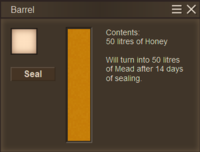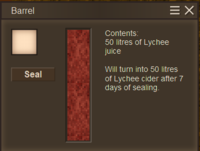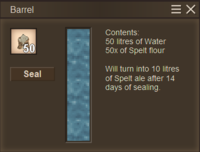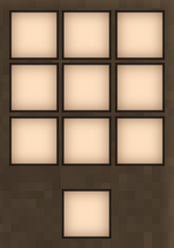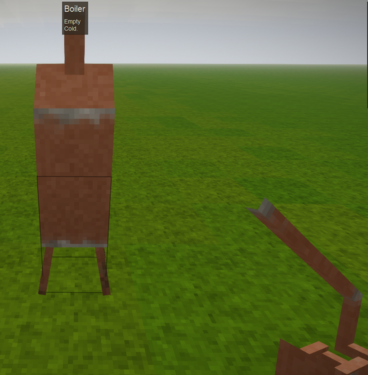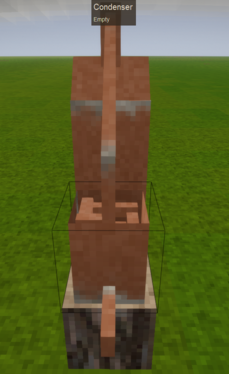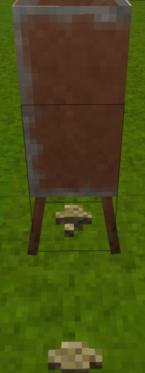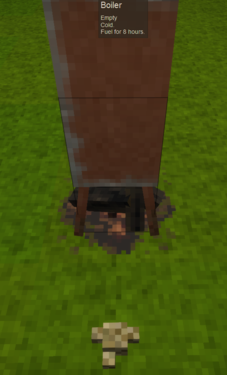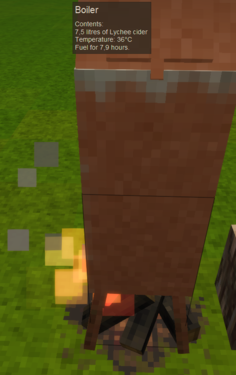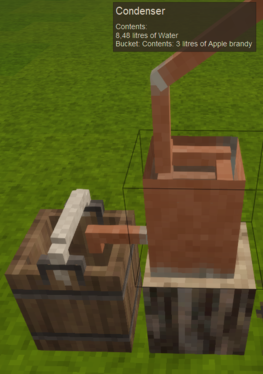Alcohol brewing/th: Difference between revisions
Munkeawtoast (talk | contribs) (Created page with "หมายเหตุ") |
Munkeawtoast (talk | contribs) (Created page with "ไซเดอร์ส้ม") |
||
| Line 32: | Line 32: | ||
| ไซเดอร์มะม่วง || 160 || ผลไม้ || 1:1 || 7 || | | ไซเดอร์มะม่วง || 160 || ผลไม้ || 1:1 || 7 || | ||
|- | |- | ||
| ไซเดอร์ลิ้นจี่ || 160 || | | ไซเดอร์ลิ้นจี่ || 160 || ผลไม้ || 1:1 || 7 || | ||
|- | |- | ||
| <span lang="en" dir="ltr" class="mw-content-ltr">Grenadine</span> || 160 || <span lang="en" dir="ltr" class="mw-content-ltr">Fruit</span> || 1:1 || 7 || <span lang="en" dir="ltr" class="mw-content-ltr">Basically a pomegranate cider, but with a fancy name.</span> | | <span lang="en" dir="ltr" class="mw-content-ltr">Grenadine</span> || 160 || <span lang="en" dir="ltr" class="mw-content-ltr">Fruit</span> || 1:1 || 7 || <span lang="en" dir="ltr" class="mw-content-ltr">Basically a pomegranate cider, but with a fancy name.</span> | ||
Revision as of 18:38, 12 April 2024
การหมักแอลกอฮอล์ มีสองขั้นตอนที่ต่างกันชัดเจน คือการหมักที่ทำได้ค่อนข้างง่าย เมื่อเทียบกับการกลั่นที่ซับซ้อน
แอลกอฮอล์
ควรสังเกตว่าหลังจากกลั่นแล้ว แอลกอฮอล์จะไม่เน่าเสียในขณะที่ยังคงให้ค่าความอิ่ม ดังนั้นการเปลี่ยนส่วนเกินของวัตถุดิบให้เป็นแอลกอฮอล์เพื่อการเก็บรักษาจึงเป็นวิธีการที่เหมาะสม ควรทราบว่าสำหรับผลไม้บางชนิดจะใช้ได้เฉพาะกับขั้นตอนการหมักแอลกอฮอล์ขั้นที่สอง "การกลั่น" แต่ "ไซเดอร์" จะยังคงเน่าเสียได้ตามปกติ (ชนิดอื่น ๆ ยังไม่ยืนยันว่าจะมีการเน่าเสียตามปกติหรือไม่)
อย่างไรก็ตาม การดื่มแอลกอฮอล์จะลดความสามารถการมองเห็น ตัวละครของผู้เล่นจะเอียงศีรษะไปมาซ้ายขวา ซึ่งจริง ๆ แล้วจะกระทบต่อการเคลื่อนไหวในเกมด้วย เนื่องจากการที่ผู้เล่นจะเดินในแนวตรงจะต้องหันในทิศทางตรงข้ามทิศทางการเอียงของหัวนั้นทำได้ยาก
ปริมาณและคุณภาพของแอลกอฮอล์ที่ดื่มจะมีผลต่อความรุนแรงและระยะเวลาของการลดความสามารถดังกล่าว
แอลกอฮอล์หมัก
แอลกอฮอล์หมักให้ทั้งความอิ่มและคุณค่าทางโภชนาการในหมวดผลไม้ ไม่ว่าวัตถุดิบจริง ๆ จะเป็นผลไม้หรือไม่ก็ตาม แอลกอฮอล์หมักบางชนิดจะเน่าเสียเหมือนกับวัตถุดิบในการทำ ที่โดดเด่นคือไซเดอร์ทั้งหมด
อัตราส่วนที่กล่าวถึงหมายถึงปริมาณวัตถุดิบที่ต้องใช้เทียบกับแอลกอฮอล์ที่ได้รับ ระยะเวลาหมายถึงระยะเวลาที่จำเป็นต้องปิดวัตถุดิบไว้ในถัง
แต่ละประเภทของแอลกอฮอล์และกระบวนการผลิตมีการเขียนรายละเอียดไว้ข้างล่าง
| ไอเทม | ความอิ่มต่อลิตร | หมวดอาหารการกิน | อัตราส่วน | ระยะเวลา (วัน) | หมายเหตุ |
|---|---|---|---|---|---|
| มี้ด | 160 | ผลไม้ | 1:1 | 14 | |
| ไซเดอร์แอปเปิ้ล | 160 | ผลไม้ | 1:1 | 7 | |
| ไซเดอร์เชอร์รี่ | 160 | ผลไม้ | 1:1 | 7 | |
| ไซเดอร์พีช | 160 | ผลไม้ | 1:1 | 7 | |
| ไซเดอร์ส้ม | 160 | ผลไม้ | 1:1 | 7 | |
| ไซเดอร์มะม่วง | 160 | ผลไม้ | 1:1 | 7 | |
| ไซเดอร์ลิ้นจี่ | 160 | ผลไม้ | 1:1 | 7 | |
| Grenadine | 160 | Fruit | 1:1 | 7 | Basically a pomegranate cider, but with a fancy name. |
| Perry | 160 | Fruit | 1:1 | 7 | Basically a pear cider, but with a fancy name. |
| Blueberry Wine | 200 | Fruit | 1:1 | 7 | |
| Cranberry Wine | 200 | Fruit | 1:1 | 7 | |
| Red Currant Wine | 200 | Fruit | 1:1 | 7 | |
| White Currant Wine | 200 | Fruit | 1:1 | 7 | |
| Black Currant Wine | 200 | Fruit | 1:1 | 7 | |
| Saguaro Wine | 160 | Fruit | 1:1 | 7 | |
| Pineapple Wine | 160 | Fruit | 1:1 | 7 | |
| Spelt Ale | 160 | Fruit | 5:1 | 14 | |
| Rice Ale | 160 | Fruit | 5:1 | 14 | |
| Rye Ale | 160 | Fruit | 5:1 | 14 | |
| Amaranth Ale | 160 | Fruit | 5:1 | 14 | |
| Cassava Ale | 160 | Fruit | 5:1 | 14 | |
| Breadfruit Ale | 200 | Fruit | 1:1 | 7 | Despite being titled as an ale, it behaves like a wine. |
Distilled Alcohol
Compared to merely fermented alcohol, distilled alcohol offers the same or even less overall saturation and no nutritional benefit. It does however cause worse visual impairment when consumed, but does not rot or turn bad with time.
Additionally, once distilled alcohol is the first step to acquiring Aqua Vitae - twice distilled alcohol - which can be used to craft alcohol soaked Bandages.
The ratio mentioned refers to the amount of ingredients required in comparison to the distilled alcohol received. The time refers to the duration the boiler and condenser need to run to produce 1L of distilled alcohol.
| Item | Satiety per Litre | Source | Ratio | Time |
|---|---|---|---|---|
| Distilled Mead | 160 | Mead | ||
| Vinegar | 160 | Apple Cider | ||
| Cherry Brandy | 160 | Cherry Cider | ||
| Peach Brandy | 160 | Peach Cider | ||
| Orange Brandy | 160 | Orange Cider | ||
| Mango Brandy | 160 | Mango Cider | ||
| Lychee Brandy | 160 | Lychee Cider | ||
| Pomegranate Brandy | 160 | Grenadine | ||
| Pear Brandy | 160 | Perry | ||
| Blueberry Brandy | 160 | Blueberry Wine | ||
| Cranberry Brandy | 160 | Cranberry Wine | ||
| Red Currant Brandy | 160 | Red Currant Wine | ||
| White Currant Brandy | 160 | White Currant Wine | ||
| Black Currant Brandy | 160 | Black Currant Wine | ||
| Saguaro Brandy | 160 | Saguaro Wine | ||
| Pineapple Brandy | 160 | Pineapple Wine | ||
| Spelt Whiskey | 160 | Spelt Ale | ||
| Sake | 160 | Rice Ale | ||
| Rye Whiskey | 160 | Rye Ale | ||
| Amaranth Whiskey | 160 | Amaranth Ale | ||
| Cassava Vodka | 160 | Cassava Ale | ||
| Breadfruit Vodka | 160 | Breadfruit Ale |
Fermentation
Different kinds of base ingredients can be fermented to alcohol by sealing them in a barrel for a specified amount of time. These different base ingredients will result in different kinds of alcoholic beverages, each with their own type name:
- Mead - made from honey
- Cider and Wine - made from different kinds of fruit and berry juices
- Ale - made from different kinds of flour fermented with water
All fermentation processes require at least a barrel, a bucket or bowl, as well as the above mentioned ingredients. Some of the these are harder to acquire then others, but generally speaking fermentation should not be attempted before entering the metal age - since barrels and buckets require a saw - and establishing a comfortably safe and well outfitted homestead.
Mead
Apart from the barrel and bucket, the only ingredient required for mead is honey. Honey can be acquired from bee hives, to ensure a sufficient supply of honey for both brewing and other usage, it is recommended to follow the Beekeeping guide and build up a well developed beekeeping enclosure.
To ferment honey into mead, it simply needs to be transferred into an empty barrel and sealed. The tooltip inside of the barrels UI will inform about the resulting amount as well as the duration the barrel will need to stay sealed. For mead, the conversion from base ingredient to alcohol is 1:1, meaning even just one litre of honey will turn into 1 litre of mead. The sealing duration however is exactly 14 days regardless of the sealed amount. Since honey doesn't spoil, there is therefore no reason to ferment in small increments, instead the player could wait until gathering a full barrel.
Cider and Wine
Making cider and wine requires a bit more preparation before the fermentation process can start. Specifically, fruit can not be fermented in its raw state, it needs to be turned into juice first. This however requires a Fruit Press. Once fruit juice was procured from the raw fruit, the following process is much like the one for mead.
To ferment fruit juice into cider or wine, it simply needs to be transferred into an empty barrel and sealed. The tooltip inside of the barrels UI will inform about the resulting amount as well as the duration the barrel will need to stay sealed. For cider or wine, the conversion from base ingredient to alcohol is 1:1, meaning even just one litre of juice will turn into 1 litre of cider or wine. The sealing duration however is exactly 14 days regardless of the sealed amount.
Raw fruit itself will spoil rather quickly, as does the juice made from it. Cider and Wine will equally spoil at a slower pace, however they can both be further processed into distilled alcohol which will not spoil regardless of source material.
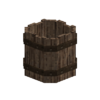
|
เคล็ดลับมือโปร:
To seal the barrel, the juice inside cannot have more then one decimal. For instance, a barrel with 1.13L cannot be sealed for fermentation, however a barrel with 1.1L can be sealed. |
Ale
To brew ale, a barrel, a liquid container as well as an amount of flour is required. Only specific types of flour can be used for fermentation, specifically:
- spelt
- cassava
- rye
- rice
- amaranth
Flax and sunflower flour cannot be used to ferment ale.
To craft flour, a quern is needed, which in turn requires full stone blocks and therefore a metal pickaxe. Since the quern can be powered by hand, automation is not required.
To ferment flour into ale, a barrel needs to be filled with water and flour in a 1:1 ration, meaning 1 litre of water requires 1 flour. However, the ingredients will not be turned into alcohol with the same ratio, meaning unlike for mead and cider, it requires more base ingredients to acquire the same amount of alcohol. The actual ratio is 5:1, which means it requires 5 litres of water and 5 flour to make 1 litre of ale - therefore 1 litre of water and 1 flour results in 0.2 litres of alcohol. This process can be done in 1 litre steps, however due to the long shelf life of flour there is no urgent need to turn flour into alcohol immediately.
The fermentation process takes 14 days regardless of the amount of ingredients.
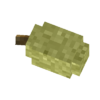
|
เคล็ดลับมือโปร:
While breadfruit turns into an alcohol titled 'Ale', it does not actually follow the same mechanics of flour based ales and instead behaves like a fruit wine instead. |
Distillation
Requirements
The process of distillation first requires a boiler and condenser. Both of these are made from processed copper, tin and lead or silver - and therefore require the player to have at least reached the copper age, including a finished copper anvil.
Shopping List
For one set of boiler and condenser, the player would need:
- 7 copper plates = 14 copper ingots
- 1 soldering iron = 1 stick and 1 copper chisel (= 1 copper ingot)
- 7 Solder Bars = 2 ingots of either lead or silver solder alloy, as well as a saw with enough remaining durability
Soldering Iron
A soldering iron is a tool used, for the moment, exclusively to craft the boiler and condenser. It requires a stick and a copper chisel - keep in mind that the durability left on the chisel will be carried over to the soldering iron. Given that one crafting process including the soldering iron only takes 3 durability - and only 2 processes are needed for a fully working distillery - it is almost advisable to use an already used chisel with only around 6 durability left over for this.
| วัตถุดิบ | สูตรคราฟต์ |
|---|---|
| 1x Chisel 1x Stick |
Solderbars
Solderbars are, for the moment, exclusively used to craft the boiler and condenser. They require a saw of any metal type, as well as ingots made from one of the two available solder alloys - Lead Solder or Silver Solder Ingots. These ingots can be created through casting, combining tin with either lead or silver in the correct amounts:
- Lead Solder: Lead (45% to 55%) and Tin (45% to 55%)
- Silver Solder: Silver (40% to 50%) and Tin (50% to 60%)
| วัตถุดิบ | สูตรคราฟต์ |
|---|---|
| 1x เลื่อย 1x Solder ingot |
Boiler & Condenser
Both of these are made mainly from copper and require a Soldering Iron made from copper as well, as seen above.
| วัตถุดิบ | สูตรคราฟต์ |
|---|---|
| 1x Soldering iron 2x Metal plate 1x Solder bar |
| วัตถุดิบ | สูตรคราฟต์ |
|---|---|
| 1x Soldering iron 5x Metal plate 5x Solder bar |
Process
The distillation setup includes a total of three steps, and should be done in a certain order to avoid placement headaches.
- The first object that should be placed is the boiler. Arrange it so there is at least one block space to one side of the boiler - this is where the condenser can be placed in the next step. Additionally, there needs to be room to access the boiler itself, since the third step of the setup needs a campfire to be placed below the boiler.
- The condenser can be placed while targetting one side of the boiler, and will then be put down on the block next to that side. It is technically possible to have more than one condenser attached to the same boiler, however only one condenser will be used at the same time.
- The next step requires a campfire to be set up under the condenser.
Press the sprint button while left clicking first the grass and then the firewood in place under the boiler. The campfire should only be ignited once the condensation process can start!
Once the setup is complete, the boiler needs to be filled with an alcoholic beverage - either fermented alcohol or once distilled alcohol - and the condenser needs to be filled with water. Before starting the process, a bucket needs to be placed under the condenser snout.
The boiler can be filled with up to 30 litres of the same alcohol, whereas the condenser can hold 10 litres of water at a time. The campfire below the boiler can take up to 4 pieces of firewood each time, which amounts to a burn time of 8 hours. At the moment, it is not possible to directly open the firepit GUI and input more than 4 pieces - however it is possible to restock fuel and alcohol during the process.
A distillation can be started and then left to work on its own. The player only needs to return after 8 hours to restart the fire with new fuel - however, this will waste fuel, as explained below.
Before the condensation process starts, the boiler temperature needs to reach about 78°C, this will take 0.2h of the initial fuel time. The temperature of the boiler will not rise above 100°C. After the fuel is consumed or the alcohol has been processed, the boiler will show as "cold" and the campfire will be extinguished automatically. However, if firewood or alcohol is restocked fast enough, the campfire will ignite again automatically. The temperature will sink during the time the campfire is out, and will rise up again to reach 100°C.
Once the campfire has been fired through once, it does not require the full 4 pieces of firewood placed down to be started again, and therefore smaller amounts of alcohol can be processed without wasting too much fuel. Similarly, the remaining fuel time of a distillation process once all source alcohol is gone remains and can be used towards the next process.
Below is a table of required source alcohol, water and fuel to receive a certain amount of distilled alcohol. The time needed includes initial heating time and the firewood needed takes into consideration, that 4 pieces are needed to start the first fire - the second number in brackets displays the actual need.
| Source Alcohol | Water | Firewood | Time needed | Resulting Alcohol* |
|---|---|---|---|---|
| 1L | 0.07L | 4 (1) | 0.3h | 0.1L |
| 10L | 0.5L | 4 (1) | 1.9h | 1L |
| 20L | 1L | 4 (2) | 3.8h | 2L |
| 30L | 1.5L | 4 (3) | 5.7h | 3L |
*Mead and grain-based ales only produce half of this amount.
Video Tutorials
| General Brewing Explanation | Full guide from juice to alcohol |
|---|---|
| การนำทางภายในวิกิ | |
|---|---|
| Vintage Story | คู่มือ • คำถามที่พบบ่อย • ซาวนด์แทร็ก • เวอร์ชัน • การควบคุม |
| ระบบเกม | การประดิษฐ์ • การกะเทาะ • การขึ้นรูปดินเหนียว • การตีเหล็ก • การทำอาหาร • อุณหภูมิ • ความหิว • การขุดเหมือง • เสถียรภาพกาลเวลา • พลังงานกล • การแลกเปลี่ยน • การเกษตร • การเลี้ยงสัตว์ |
| โลก | การสร้างโลก • ไบโอม • สภาพอากาศ • พายุกาลเวลา |
| ไอเทม | เครื่องมือ • อาวุธ • ชุดเกราะ • นักเย็บผ้า • กระเป๋า • ทรัพยากร • อาหาร |
| บล็อก | ภูมิประเทศ • พืช • ของตกแต่ง • แสงไฟ • Functional • แร่ |
| เอนทิตี | เอนทิตีดุร้าย • สัตว์ • NPC • ผู้เล่น |
| เบ็ดเตล็ด | รายการคำสั่งไคลเอนต์ • รายการคำสั่งเซิฟเวอร์ • คู่มือเริ่มต้นโหมดสร้างสรรค์ • ระบบบอท • WorldEdit • กล้อง Cinematic • การอัดวิดีโอแบบกำหนด FPS ได้ • ServerBlockTicking |
